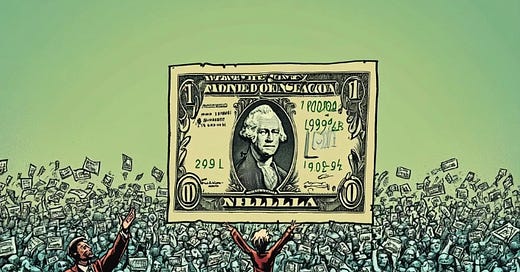How Game Theory Predicts Our Current Political Chaos
The hidden forces driving us deeper into polarization and conflict.
Would you ever pay more than a dollar for a single dollar? Sounds absurd, right? Yet, thanks to the work of economist Martin Shubik—and a few dinner parties that reportedly ended in marital distress—we know that many people would.
When you consider the game theory paradox this exercise represents, you probably already have done this more than once since it is a trap of human nature. In politics and on the world stage, it’s arguable that we are in the midst of such a cycle right now. But first, a little explanation.
The Dollar Auction: An Absurd Game
This video provides a nice introduction.
For those who prefer text, this is a quick summary.
Imagine a game where two or more players bid on a dollar bill, with the winner paying the highest price, but the second-highest bidder also pays their bid but gets nothing in return. Ouch!
When a group agrees to begin an auction like this and fails to stop at the $0.50 mark, an escalating bidding war is now underway. Driven by a fear of losing the sunk costs for no benefit, players become increasingly invested in winning the dollar, even if it means paying more than its face value. Bidders will rationalize their decisions, thinking, “Just another bid or two, and I’ll be the one coming out ahead!”
This isn't just a parlor trick or an intellectual curiosity—it’s a trap woven deep into human psychology. And unfortunately, it plays out on a much larger, more destructive scale in politics, business, and war.
Consider when two sides are deeply entrenched in their beliefs, they'll often invest more and more resources (time, money, reputation) to "win" the argument, even if it means sacrificing their own well-being.
Another way to think of this is the dark side of, “in for a penny, in for a pound.”
Dollar Auctions Costing Lives and Liberty
If we consider the increasingly bitter rhetoric, lawfare, and the breakdown of conversation across political lines, we can see that over the course of the last several decades, U.S. politics has descended into a dollar auction bidding war, to see who ‘wins’ the west.
It’s not obvious when we passed the $0.50 mark, but looking at events just over the last week, with individuals engaging in everything from arson to wiping their bare buttocks on Teslas in rage at Elon Musk’s role in the new administration, at the same time SpaceX rescued stranded astronauts, clearly we have.
To our benefit, we do have this game theory construct to help make sense of this bizarre behavior.
Consider some of our voters. When their candidate lost in November, it was at a point where paying for their second-place bid was bound to be painfully high. You could make the argument that they had gambled so much, with rhetoric calling for restrictions on free speech and painting the opposition as literally Nazis, it was, by necessity, their final bid.
Yet to take the L would mean owning up. Not just to slandering more than half the electorate and betraying our highest constitutional right, but to a laundry list of dealings that are so wildly out of step with the purported values of these voters that the cognitive dissonance can be nothing short of crippling.
Think of it: media outlets who once touted their journalistic integrity ignored big stories of wrongdoing, railroading people speaking out and slandering them with slurs.
Government officials, said to be top experts in disease, complicit in harming millions with bad recommendations, withholding studies, and self-interested lies.
Even everyday people who swear up and down they care about honoring the inherent worth and dignity of every person cheering for the assassination of their enemy. Peaceniks clamoring for war.
This is a portrait of self-betrayal and psychological incongruence.
If we look to the past, like the end of WWII, the fall of communism in Eastern Europe, and the breakup of the USSR, all saw waves of lethal self-harm among the former ruling class.
For those confused that many neighbors, friends, and celebrities are doubling down on what seems a nonsensical worldview, the takeaway should be that the weight of the shame associated with betraying one’s personal values is a loss some may rather die than face.
Those who think themselves the winners right now should take heed of their friends and neighbors struggling to hang on to a narrative that allows them to see themselves as noble, as they act like jerks.
While a certain amount of anger at being mistreated over the last four years is understandable and even healthy, it’s far better for those now in power to channel this energy into seeking justice and renewing a commitment to the rule of law. Following the siren song of lawfare, lies, or other loathsome behavior because vengeance feels good is the pathway to corruption and a redoubling of the dollar auction.
We would do well to stop this cycle without starting a new one.
There is significant danger here. If the new administration wantonly indulges in throwing around power now that they have it, the risk is setting more precedent that weakens the protection against tyranny that our Constitution was built to prevent.
Values, the Foundation of Character
If this is indeed the end of a several decade-long dollar auction, or a brief pause before a raft of burned Teslas turns into riots or a minor rebellion, we can take this moment to consider what matters and who we want to be in the face of chaos.
History again can be a guide.
The Civil War is today called the Civil War in part as an effort to reconcile the divide between the North and the South. It was an accommodation to the dignity of the Southerners who maintained their secession was legal, therefore not a rebellion, which they viewed as an insult.
This was not a perfect solution because it allowed for both sides to continue to claim their cause was noble, and the real reasons for war were quietly covered over. While not ideal, that may have been the best option. To this day, more Americans died in the Civil War than in all other wars combined.
Pulling out of that nosedive must have been bewildering and disorienting. Looking around at the battlefields, the destruction of friends and family lost, could they allow themselves to see what their single-minded focus had wrought? Probably not.
The book that I’m currently reading which inspired much of this post, Moral Calculations by László Mérö, begins with a comic of two distorted-looking athletes captioned, “Boxing is a sport in which the winner is also badly beaten.”
If we can see this pattern and write books about it, surely, we can learn to out-wit our own worst instincts before we lose ourselves to rage.
The real test of character isn’t winning—it’s knowing when to stop playing a destructive game. Forgiveness, forbearance, humility, and grace aren’t just noble ideals; they’re survival strategies. And we’d do well to remember them before we pay far more than a dollar to avoid the pain of admitting we have shortcomings.
Housekeeping
My mind is on ethics in part because I am at war. I have done my regular springtime checks of my plant friends, and I have discovered that the bald cypress sapling I planted three years ago was ruthlessly struck down. As you can see in this picture, it was lopped off at no more than a foot off the ground. I blame the local deer population, though admittedly, the only evidence I have is a nearby trail and the stump itself.
After I composed myself, I decided to replant. I have reconsidered the bald cypress. I think its knees might someday come up in places they shouldn’t, so I opted for a black tupelo. This might make me a glutton for punishment because its fruits will make it the target of browsing, but I got a great deal on a sapling, and I have protected it with a mesh sleeve.
I had neglected to protect the bald cypress with a sleeve because they were supposed to be deer-resistant. So come fall I’ll be sure to pick any fruit and hang soap. This will be the new routine at least until it’s bigger. In the interim, I’ll shake my fist.
We are otherwise into early spring here. The crocus, daffodils and tulip magnolias have bloomed and were quite lovely until we had a monster storm. We were fortunate that no tornados landed close by. One settled a handful of miles away, but it was mercifully weak. Nevertheless, the blooms took a beating and many won’t return until next year. Alas.
________________
I’ve also been on several podcasts lately. If you haven’t yet, please check them out. The list is below. If there is something in particular you’re curious about, do ask questions in the comments.
Ideological Oasis with Karen King,
The Radical Center with Leslie Boyce,
Ryan Rogers’—author of The Woke Mind—channel,
Outliers in Exile with Gen X Jeff, and have scheduled two recordings on the horizon. Thank you all!
On the Bookshelf
Hallelujah! I scrounged up some precious reading time. I think the extra sunlight and warmth helped. So naturally I added two new books rather than finish what I’d already started. Everyone works this way, right?
Surely You’re Joking, Mr. Feynman! Adventures of a Curious Character by Richard Feynman
The New Know-nothings: The Political Foes of the Scientific Study of Human Nature by Morton Hunt
Moral Calculations: Game Theory, Logic and Human Frailty by Laszlo Mero
The New Oxford Annotated Bible with Apocrypha: New Revised Standard by Marc Brettler, Carol Newsom, Pheme Perkins
Help Keep This Conversation Going!
Share this post on social media–it costs nothing but helps a lot.
Want more perks? Subscribe to get full access to the article archive.
Become a Paid Subscriber to get video and chatroom.
Support from readers like you keeps this project alive!
Diogenes in Exile is reader-supported. If you find value in this work, please consider becoming a pledging/paid subscriber, donating to my GiveSendgo, or buying Thought Criminal merch. I’m putting everything on the line to bring this to you because I think it is just that important, but if you can, I need your help to keep this mission alive.
Already a Premium subscriber? Share your thoughts in the chat room.
About
Diogenes in Exile began after I returned to grad school to pursue a Clinical Mental Health Counseling master’s degree at the University of Tennessee. What I encountered, however, was a program deeply entrenched in Critical Theories ideology. During my time there, I experienced significant resistance, particularly for my Buddhist practice, which was labeled as invalidating to other identities. After careful reflection, I chose to leave the program, believing the curriculum being taught would ultimately harm clients and lead to unethical practices in the field.
Since then, I’ve dedicated myself to investigating, writing, and speaking out about the troubling direction of psychology, higher education, and other institutions that seem to have lost their way. When I’m not working on these issues, you’ll find me in the garden, creating art, walking my dog, or guiding my kids toward adulthood.
You can also find my work at Minding the Campus






